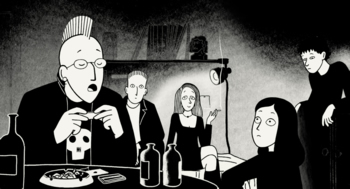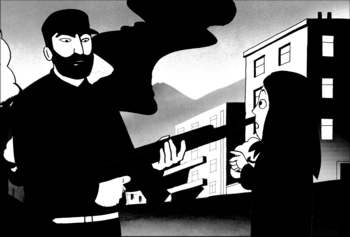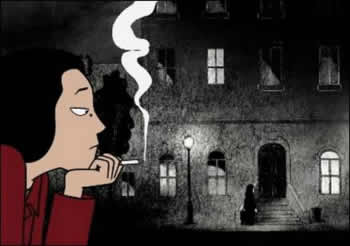Movies

New Releases • A-D • E-H • I-P • Q-Z • Articles • Festivals • Interviews • Dark Knight • Indiana Jones • John Wick • MCU
Marjane Satrapi:
Drawing from Conflict and Comics
Page Two
Revolutionary Roots
Persepolis is based on Satrapi's experiences growing up during the Islamic Revolution of the late 1970s and 1980s. With revolutionary fervor making an enormous impression on one side and her parents providing a more rational explanation for the events unfolding around her on the other side, Satrapi grew up during a particularly chaotic time in Iran's history.
That's when the Shah was deposed, Ayatollah Khomeini exploited discontent among the populace, and American hostages were held captive for 444 days.
As a natural progression of youth, Satrapi began to question what was going on around her and the naturally rebellious nature of a teenager collided with the increasingly repressive stance of her government. In 1980 it became mandatory for women to wear the veil, a garment that stands as a complete clash to her punk sensibilities.
Given their daughter's proclivities, Satrapi's parents sent her to live with a family friend in Austria when she was 14. After four years of eye-opening experiences, Satrapi returned to Iran in hope of settling into a stable life. After finding friends' lives moving in different directions, marriage proving to be unsatisfactory, and oppression having taken its toll on the citizens, Satrapi found herself stuck in a most unenviable situation.
In 1994, she left Iran and moved to France, effectuating the exile that serves as the nexus of Persepolis.
"I can go back, but I don't know if I can leave again," she chuckled with what might be considered a slight bit of resignation, "this is the problem. Actually, I don't know what will happen. That's why I don't go."
European Integration
With Islamic fundamentalism escalating as never before, tensions are on the rise not only in the United States, but around the world. Headlines talk about immigrant unrest in Paris and integration issues in Amsterdam.
But, for Satrapi, the question is not about Christian and Muslim. The question is about poor and rich. And it's a topic that got her fired up.

Marjane declares to her grandmother that no old women
will suffer again for she is going to be a prophet when she grows up.

Marjane chats with friends in Vienna.

Marjane explains to a guardian of the revolution that she
lives near where a bomb fell and that he needs to let her by.

Marjane reflects on the past.
Persepolis stills courtesy of Sony Pictures Classics
"They talk about it like it was a religious problem," Satrapi said. "This is a question of poverty. I am absolutely not concerned by this question, because I don't come from a poor neighborhood, because my parents, they, are not workers that go and work in the factory in Europe. My parents, they are educated people, they have always, in their life, they have enough money. I have an education, I speak six languages.
"For that, you have to ask this question from the poor people. In Europe they make this big fuss, 'This is the Muslim community.' Come on. The European, they have gone and they have fucked these Muslims and their countries for years and years. For more than a hundred years. French, they had them making shit in North Africa. The Dutch people went and sold whatever was in Indonesia and Malaysia, then after the second World War, they say to this guy, 'Come here, and you will reconstruct our country for us.' They put them into the suburb, they treated them like shit. After three generations, the kids of these guys, that are born in France and their parents that are born in France, are still called Arabs. And they're still poor and they cannot get a job just because of where they're born. And then they are like, 'Oh, why do these people have a problem?' Because you fucked them, that's why they have a problem. Because this guy, even if he has an education, he can never get a decent job because of his name. Because he is condemned to be a poor guy; this is why, these people, they have a problem. It's not because they are Muslim."
There's a lack of ownership of, or at least a distancing from, history permeating through the European psyche.
"America, you have gone and made a whole mess in Vietnam. You did it. But the first movie about Vietnam, you make it yourself, here in this country. France, they have fucked the Algerian. There is not one movie. They are starting it 45 years after, making movies about these things, and still it is a taboo subject. This is the big difference.
"I love Europeans when they say, 'Americans, they went and they killed all the Indians.' I'm like, 'Americans, they are not some people that came from the planet Mars. That was you. That was European people that went and killed all the Indians. Americans, they are you. You did it. That was you who called yourself 'American' afterwards. That was the Scottish, and the Irish, and the German, and the Dutch, and the French; that was these people that killed the Indian and then they became American, but they were European.'"
Admitting to, and accepting responsibility for, history is still an issue that needs to be faced straight on, as Satrapi sees it.
"The biggest religious murdering, from the killing of the Puritans so that they had to come here (to America) to the killing of six million Jews, to the killing of the Protestant, the biggest religious killing in total has been made in Europe, nowhere else but Europe," Satrapi said.
"That is the old colonialist country and they will never admit that they have done something wrong. And when you don't admit, then you have problems."
Those at the receiving end of the aggression, such as the African soldiers who made sacrifices for France during the World Wars, have never been rightfully thanked. Instead, they receive quite the opposite, in Satrapi's view.
"Then they say, 'These people, you know, bad education, they are so aggressive.' I mean, come on, you treat anybody like that, they become aggressive after a while. Put yourself in their place, what would you do?
"It is very sad that I have to say that, because I am really not representative of these people. I really don't come from a poor background and all of that. It's just a question of decency and thinking. Just think of what you have done to this people."
In regard to young people living in the suburbs of European capitals who turn into radical Islamists, Satrapi sees it as boiling down to a matter of respect. Given 50 euros, a youth can be enticed to follow a preacher from here to there and get indoctrinated along the way.
"Why does he follow him? Because he is respected. You don't want this guy to follow these people? Jesus fucking Christ, just respect him! But they hate them because they are racist and they don't want to say that they are racist. So instead of saying 'We are racist,' they will say, 'He is the bad guy.' This is it. And then these people, they become angry. And then, since they are angry, they become more angry, etc., etc. And then everybody becomes mad and stupid. This is the result of it. If we think that they are the stupid guy and we are the intelligent guy, shouldn't we behave a little better than them?"
Recharging Batteries
Shifting back to less weighty matters, Satrapi is looking forward to taking a break and taking some time to refresh now that Persepolis is making its way to the big screen.
"Of course I want to write other books and of course I want to make other movies," Satrapi said, "but now is too early because from the second I finished this movie I have been on promotion.
"I will go to vacation. I will smoke lots of cigarettes. I will have lots of fun. Because now I am an empty person. It sounds like that (she thumps her hand several times on the table). Then I have to have my heart and my brain full again. And then I will be able to give something. I am so empty that I don't have anything to give now. To be able to tell a story, I have to have the feeling that I want to tell a story."
Satrapi's hands are not the type to stay idle for long, however. Even as we conversed, she sketched out characters on a little note pad.
"I took my time. My career is only seven years from the second I was published until now," Satrapi noted.
And it has indeed been an eventful time. To her credit are five children's books, several graphic novels, a mural for a museum, posters, and the Persepolis movie. She's even sung a song.
"I'm never pushy. Things, they have to happen. If they happen, I put all my energy. If they don't want to happen, I don't push for them to happen because life is too short," Satrapi said.
"I don't consider time as my enemy, but as my best friend. I know how to take the time. So the time is extremely sympathetic and a gentleman with me."
• Originally published at MovieHabit.com.
- back -


